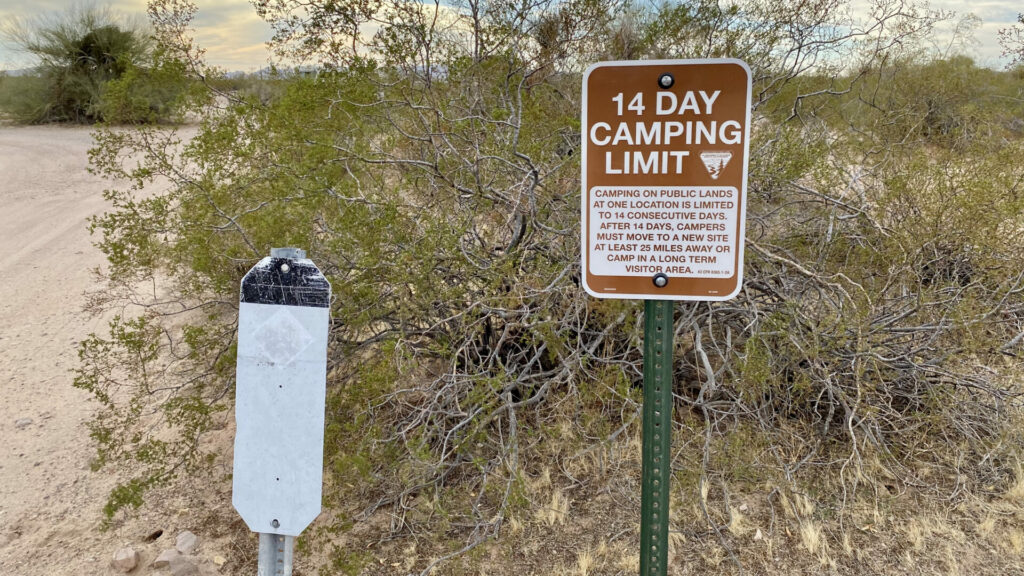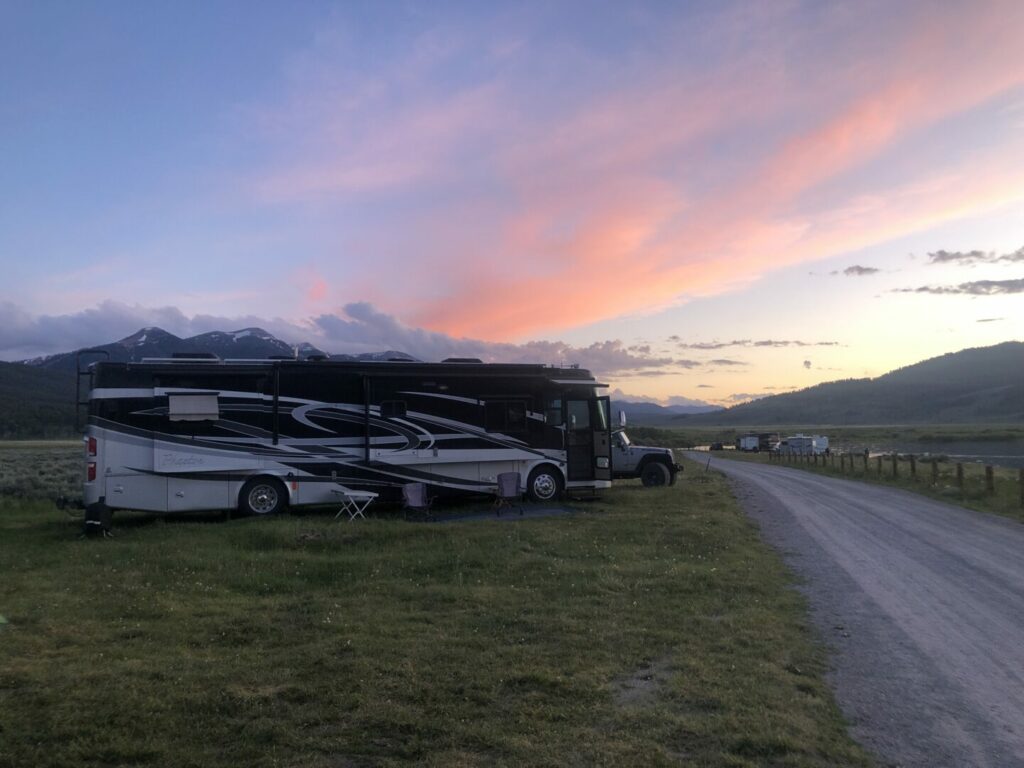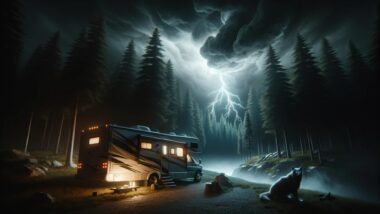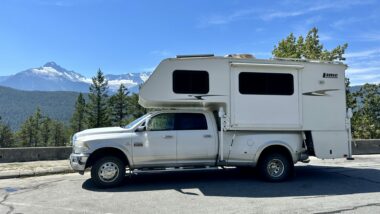Table of Contents Show
We’ve not been quiet about the fact that boondocking is by far our favorite way to camp. Unfortunately, we’ve heard RVers share some misunderstandings and outright lies about it.
To help avoid any confusion, we’ve decided to address and expose the most common lies about boondocking.
Today, we’ll clear the air and share the truth about boondocking. Have you been believing a lie?
Let’s look and see!
What is Boondocking?
Boondocking is a style of camping by individuals in recreational vehicles on public lands, often in remote locations. Typically, these campers use campsites on public lands in national forests or managed by the Bureau of Land Management (BLM).
As campgrounds have become incredibly crowded in recent years, it’s no wonder that boondocking has been gaining in popularity.
However, individuals must be self-sufficient because it takes place outside an established campground. They’ll need to generate their power, supply their water, and find a place to dispose of trash and wastewater.
Because most of these spots are first-come, first-served, snagging a spot can be a gamble. This style of camping often requires an increased amount of planning and preparation. However, its benefits can be worth it.
Boondocking Has Become Incredibly Popular
We mentioned that crowded campgrounds are one of the biggest reasons boondocking is becoming incredibly popular.
Unfortunately, this has become a problem in some areas as individuals aren’t respecting and caring for the land. The overuse of some campsites is resulting in tremendous damage to the land.
In some cases, rangers take swift action and shut down overnight camping or restrict access to a site. This can add another level of complexity to an already challenging camping style.
You could arrive at a spot and discover it’s no longer available because previous campers have ruined it for others.
As a result, you must always have a backup plan to ensure you can find a place to park your rig.
Common Lies About Boondocking
Over the years, we’ve heard half-truths and straight-up lies regarding boondocking. Unfortunately, some people accept them as gospel and continue spreading misinformation. Thankfully, we’ve spent hundreds of nights boondocking and can help clear any confusion.
It’s Always Free
One of the biggest lies we’ve heard is that boondocking is always free. While you can easily find plenty of free spots, it’s not always the case.
Some of the best spots require you to acquire a permit, which may cost anywhere from a few bucks to $10 to $15.
However, since these are typically valid for a week or two, it’s still an incredible savings over staying in a campground.
Additionally, you can find Long-Term Visitor Areas (LTVA) where you can stay for months at a time.
One of the most famous spots for this is in Quartzsite, Arizona. For only $180, you can purchase a seasonal permit, which allows you to stay from September 15 to April 15.
You’ll have difficulty finding a better value than boondocking in these situations.
Unlimited Stays
Despite what you might have heard or thought, boondocking sites typically always have stay-limits. Unfortunately, some people choose to ignore them and overstay their welcome. Generally, the expectation is that you’ll move on your way after seven to 14 days.
However, it can be as little as five days in some of the most popular locations. Again, it’s entirely your responsibility to be aware of the requirements.

No Rules Apply
One of the biggest perks of boondocking is the tremendous freedom it provides. You’ll often get to choose where you park and how you set your campsite.
In addition, there’s generally no one monitoring you to ensure you behave yourself. However, just because you have more freedom doesn’t mean there aren’t rules to follow.
Unfortunately, the rules and regulations can vary considerably from one location to the next.
Burn bans are common, especially in dryer areas out west during the fall. As a result, you may not be able to enjoy something as simple as a campfire.
You must know the rules and regulations specific to the area. When in doubt, call the local land management agency to answer any questions.
Depending on the violation, some rangers may be less forgiving and not accept ignorance as an excuse. So, know the rules they expect you to follow while boondocking.
Unlimited Resources
One of the first things you realize about boondocking is that you have to manage your resources wisely.
You only have so much food, water, power, and space in your waste tanks. The longer you can make them last, the more time you can spend enjoying camping off the grid.
For some, this is one of the most challenging aspects of boondocking. Learning to conserve water and make your tanks last as long as possible is a skill you acquire with time.
The more time you spend boondocking, the more you pick up on tips and tricks. It might surprise you how long you can go boondocking.
Complete Isolation
We mentioned earlier that boondocking is becoming increasingly popular. As a result, there’s no guarantee that you will be alone.
During the busiest time of year, South Dakota’s popular boondocking spot, Nomad View, could have hundreds of nomads staying there.
We’ve loved finding spots to park in complete isolation and be away from others.
However, we often found that we weren’t completely isolated from others. We’d often pass other campers while navigating forest roads or camping areas.
Some rangers are extremely strict and watch for violators overstaying their welcome. On the other hand, rangers are outnumbered in many areas, and they can’t keep track of stay limits.
Just because you may not get caught overstaying your welcome, doesn’t mean you should. Always follow the limit, whether there’s a chance you’ll get in trouble or not. It helps care for the land and allows everyone to take advantage of it.

It’s Always Quiet
Another common lie people believe about boondocking is that it’s always quiet. Again, just like we’ve been in situations where it was extremely isolated, we’ve been in deafeningly quiet areas. However, that’s not always the case.
We’ve also been in spots where a fellow camper set up their spot for the weekend and immediately started running their generator. It ran for the entire time they were parked nearby. It made for a long weekend. Needless to say, we weren’t disappointed when they packed up on Sunday morning.
It’s Dangerous
The final lie we’ll discuss is that boondocking is dangerous. Just like camping in some campgrounds can be unsafe, the same is true with boondocking. You must take the time to research areas and be aware of your surroundings.
We use Campendium and iOverlander throughout our adventures. When planning our spots, we rely on reviews from other users. We’ve skipped several spots because reviewers shared safety concerns, wild parties, and less-than-hospitable locals.
By doing some research and using standard safety precautions, boondocking can be just as safe as any other type of camping. However, the major disadvantage is that since it’s often in remote areas, assistance can be hard to get when things don’t go according to plan.
Don’t Believe Everything You Hear About Boondocking
Whether you heard it through the grapevine or in a Facebook group, you can’t believe everything you hear about boondocking. The best way to discover the truth is to get out and try it yourself. Start with shorter trips to popular areas to build your confidence. However, we want to warn you that boondocking can be addictive. Like us, it may become your favorite type of camping.







We boondock most of the time. Not much BLM in the Northeast so we do Boondockers Welcome.. A couple sites not much to talk about and others were spectacular ! We grab electricity when we can and never complain about the $$ (generally $15 or less). We avoid RV Resorts and use RV Parks on longer trips to replenish water and dump if we need to. I installed a dump at home so that solves one difficulty. Yes, we’re weekenders.